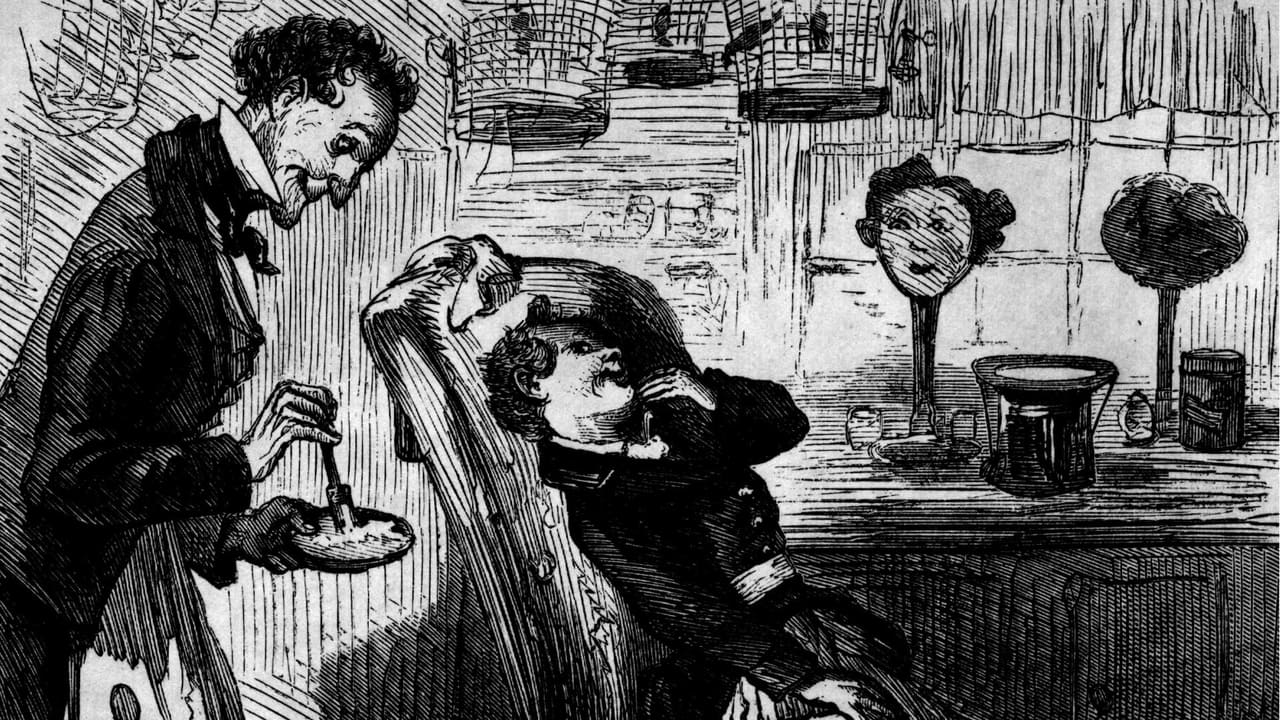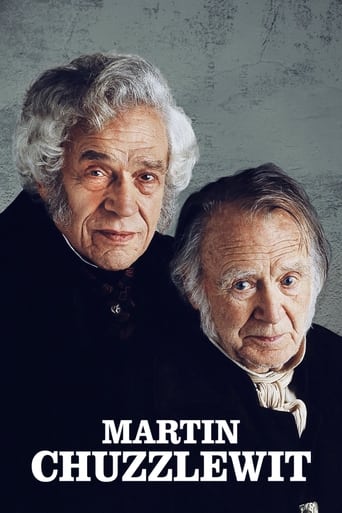

Martin Chuzzlewit is perhaps not Dickens at his best but it has the ingredients that make him such a great author in the first place and it deserves to be better known. This 1994 adaptation is fabulous in all areas, one of the best Dickens adaptations of the past 25 years. The production values are splendidly evocative, not too bleak or too squeaky clean, and the adaptation is shot with natural skill. The dialogue is very Dickenesian, with its fair share of funny and affecting parts, while the story while leaving some things out is compelling and faithful in spirit and style to Dickens, respecting his work rather than disregarding it. The pace is just right, the drama is given time to breathe but there's no signs of tedium, while as to hope from a Dickens adaptation the characterisations are rich. Of the fine performances, Tom Wilkinson dominates, a brilliant performance and he hits the arrogant and hypocritical sides of Pecksniff spot on. Phillip Franks is incredibly moving as Tom Pinch. Paul Scofield's titular character is played with splendid dottiness and the much missed Pete Postlethwaite is superb, and we also have an unforgettably hilarious Elizabeth Spriggs and Keith Allen who has never been better. All in all, an underrated book given classic treatment. 10/10 Bethany Cox
... View MoreArchitect Mr. Pecksniff attempts to inveigle himself into the good graces of the senior, wealthy Chuzzlewit (Scofield), via all manner of solicitousness and over the top ingratiation.I didn't think much of Tom Wilkinson's acting skills before seeing this. But for the first hour or two he steals the show as the greedy nincompoop Pecksniff. He assays this incorrigible dope with quite a varied catalog of idiotic reactions and barely-disguised avarice. Pete Postlethwaite as an unctuous servant is amusing. The actor playing the title character telegraphs that he's the mumbling, no-good sort long before any character explicitly discuss it. I guess my problem with this is that the narrative and its complications are so commonplace that it never drew me in, and I couldn't tell you what all the mediocre convolutions of the middle do for the story. They didn't engage me, amount to much, or stand out in the Romantic canon. And my appetite for one-dimensional bad guys was long ago filled by Hollywood blockbusters. All that and the usual, insipid, high-Victorian ending in which multiple story lines all reach their moral climax in the same 4 minutes. guh."Saffie" from Absolutely Fabulous is one of Pecksniff's daughters and the dimwit villager from Vicar of Dibley is the other one.
... View MoreI'm not familiar with the novel, so I can't say how closely the characters as they are portrayed match any cognitive template, and I've only seen about half the episodes but that's enough to instigate a comment. Paul Scofield is old Anthony Chuzzlewit, supposedly rich beyond measure, but hoarding his wealth, living in a dreary inn in London with his grandchildren and some others in attendance. Most of his friends and relatives can't wait for him to kick it so they can get their hands on his money.Of his friends, Mr. Pecksmith is the most appalling phony. Tom Pinch, weird looking and a little dumb, may be the nicest person in the story. He provides the church with music, gratis, or, as he puts it, "I touch the organ for my own amusement." John Mills is Mr. Chuffey, the addled and devoted servant who is dotty but genuine. Keith Allen is Jason Chuzzlewit, Martin's direct descendant who hovers over the wrinkled old fellow waiting for the last breath to be drawn. Allen is a fine actor. He was a outstanding supercilious serial murderer in the BBC's "The Life and Crimes of William Palmer." Here he's openly vicious and his manners are repugnant. He always seems be sneering and eating with his mouth open, both at the same time.Anthony Chuzzlewit himself is no prize. "Aggravation flows through his veins, not blood." He loathes the fawners and the greedy and does no more than put up with the few decent people he meets. Mercifully he passes on. Shortly after, his brother Martin shows up for a visit, also Paul Scofield but a more mellow sort of Chuzzlewit, concerned not just about himself and his body sheath but about the happiness of others. That's about as far as I've gotten so far.Here, as in so many other BBC series, no one can help being impressed by the direction, the acting, and the production values on display. It's a magnificent effort. London never looked quite so crummy and oily, nor its citizens so ragged. The older attempts to put Dickens on celluloid, the ones from Hollywood, were all filmed in sunny California and the cheery settings shed a different light on the proceedings. Lean's two shots at Dickens were more realistic but not as muddy and dark as this series. (Insert favorite vulgar imprecation here), it's depressing!No wonder one of the younger characters takes off to make his fortune in America -- all that Hollywood sunshine. Actually Dickens himself made a trip to the States and had a chat with Edgar Allan Poe. One can only imagine what they had to talk about. One's demons were psychological, the other's social.I'm happy when a classic English novel is given a proper miniseries treatment instead of being pruned down to two hours or so. But it generates problems too. There are half a dozen narrative threads that need to be followed. I had a hell of a time with Jason Chuzzlewit's courtship of one or another of the two sinister sisters, for instance. (He switches his pursuit at the last minute.) And at six or so hours of screen time, divided into many episodes, it's sometimes a little hard to keep the threads and the characters straight, to separate the warp from the woof. It must have been even more difficult when the episodes were originally presented on different nights. These multi-charactered plots represent one of the few instances in which recognizable faces, faces of popular actors, help us follow the goings on.
... View MoreIn 1842 Charles Dickens was at a critical point in his career. His attempt at a series of stories told by different characters to each other, "Master Humphrey's Clock", was not a success, although it produced a popular novel ("The Old Curiosity Shop"), and a first attempt at a historical novel ("Barnaby Rudge"). He decided to take a trip to the United States. The results was bad. He found Americans thievish for not giving him copy-write protection. He found them hypocrites for screaming for freedom, but winking at slavery. He found their cities far less acceptable than the English ones. There was less gentility. There was more rough edged belligerence (especially to the old enemy: England). He hated it. He returned to England and wrote "American Notes". The book roundly attacked the Americans. He was not forgiven for years.He compounded the act in his next novel, "Martin Chuzzlewit", from 1843 - 1844. In this period, ironically, he was to start writing his small Christmas novels, the first of which ("A Christmas Carol") would become immortal - far more than "Chuzzlewit" actually did. But "Chuzzlewit" is regarded by critics as the best of Dickens comic novels. Yet if one person out of five reads the novel today I'd be surprised.The novel deals with young Martin Chuzzlewit (Ben Walden), who is apprenticed to his cousin the architect Seth Pecksniff (Tom Wilkinson). Pecksniff is the British equivalent of Moliere's Tartuffe - the arch-hypocrite. As "tartuffel" is the term based on Moliere's character, so is the word "peck-sniff" due to Dickens (in "You Can't Cheat An Honest Man", an angry Mr. Belgoody - Thurston Hall - tells off Larson E. Whipsnade - W.C.Fields - calling him both a tartuffel and a peck-sniff). Pecksniff, pretending to be religious and good, back-stabs his way through the novel, stealing ideas from other architects (including Martin), and pushing his plans to gain control over Old Martin (the grandfather of the hero), a wealthy, retired merchant. Old Martin is played by Paul Schofield. Schofield also plays Old Martin's younger brother Anthony, who has a son Jonas (Keith Allen). Jonas wants to inherit too.Dickens had demonstrated a grasp at the criminal mind in his handling of Bill Sykes and Fagin in "Oliver Twist". But the burglar and the thief trainer were relatively simple types (although Sykes fury at Nancy and his subsequent self-destruction was unique for British literature at that time). Jonas was a higher class criminal - a murderer who did it for money, not anger. He first destroys Anthony, and then goes after his cousin Montague Tigg, a cousin who is a swindler and a blackmailer. The killing of Tigg (whom Jonas ambushes while he is riding in a gig) is based (somewhat) on the murder of William Weare by John Thurtell in 1823. But there is more than that in Jonas. He is rejected by Pecksniff's daughter Charity (nicknamed Cherry / played by Emma Chambers), who subsequently gives in to his courting - only to discover he pursued her to punish her for initially rejecting him. He is blackmailed by Tigg into investing in a financial swindle, and purposely pulls his father-in-law Pecksniff into the swindle because he hates the man. Dickens made Jonas an in depth study of evil, and he becomes a center of fascination in the plot.Meanwhile Young Martin goes to America when he breaks with the thieving Pecksniff. He goes with his friend Mark Tapley (Steve Nicholson). They find nothing likable about Americans who are nasty brutes for the most part. They have bought land from the Eden Land Company, only to find it is swamp land. The only good point is that young Martin's personality does change - he becomes less selfish because Mark and he have to depend on each other for survival.The other comic person in the novel is Sairey Gamp (Elizabeth Spriggs), a drunken midwife who assists Jonas at times. She keeps her acquaintance Betsy Prigg (Joan Sims) informed all the time of her best friend, Mrs "Arris". George Orwell puts it into proper perspective: More details are given about Mrs. Harris than found in any biography about a real person - for only the drunken Mrs. Gamp sees Ms Harris. Betsy finally calls her up short on this claiming, "I don't think there is such a person." Horrified, Mrs. Gamp insists there is. Later, a desperate Jonas requires a woman to watch someone - Mrs. Gamp, almost heroically, pushes for Mrs. Harris.The series was quite good in what it showed from the novel, but it cut out the entire American section - really the heart of the novel as it deals with the hero. It was found to be too negative an image. Whether it was or not it weakened the production. What is left is quite good, but one wishes the American chapters had been left in as well.
... View More